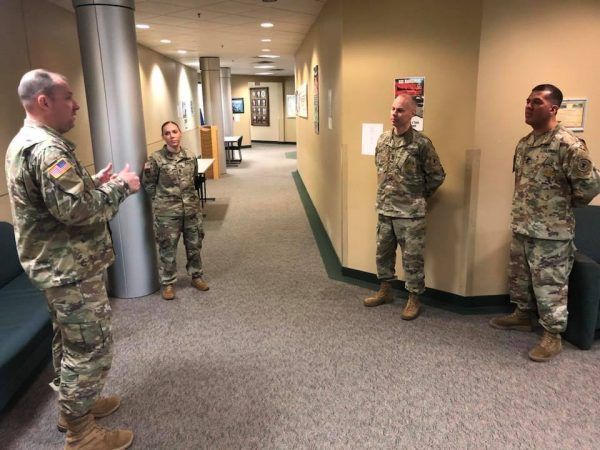“So what’s going on? Uncle Sam wants to know why so few are willing to join the military.“
This is the first in a series of two articles dealing with the danger to national security associated with a lack of qualified recruits for the Armed Services.
Military Times reported the US will launch a two-year effort to find ways to increase military and civic service among its citizenry, especially US youth. The initiative “will be spearheaded by an 11-member commission that will travel the country in 2018 and 2019 to ignite a national conversation around service and develop recommendations that will encourage and inspire all Americans, particularly young people, to serve. Ultimately, the goal is for every American to be inspired and eager to serve,” the National Commission on Military, National, and Public Service said in a press release.
So what’s going on? Why are so few millennials, the prime age group for new recruits, unwilling to join the military? I posed these questions to both current and former military members. Their candid insights and opinions on why so few are ready to serve offer keen observations into this current phenomenon.
During the draft and the Vietnam War in the 1960s, serving in the military was not an attractive career option in the minds of young men. Despite that, approximately 75% of service members in Vietnam were volunteers. While more than 9,087,000 served over the course of the entire conflict, only 1.8 million were drafted during that period. The draft ended July 1, 1973, and since that date, the US military has been an all-volunteer force.
Ironically, in 1969 and four years before ending the draft, the US was already studying just what the nature of the military would become. During that time a member of the president’s commission on an All-Volunteer Armed Force wrote to its chairman. Crawford H. Greenewalt wrote, “While there is a reasonable possibility that a peacetime armed force could be entirely voluntary, I am certain that an armed force involved in a major conflict could not be voluntary.”
Over the years following the end of the draft, Mr. Greenewalt’s comments rang untrue, but in this age of unending military engagement, enlistments are dropping. The issue of recruiting enough volunteers to maintain the US military at levels necessary to sustain the many missions they are tasked with has once again become the 500-pound gorilla in the room.
Millennials came of age during the global war on terror. The US military conflicts in Iraq and Afghanistan after September 11, 2001 have resulted in a long, drawn-out war, and millennials are far less likely to serve than previous generations. Ironically, millennials are in line with every other demographic group in America in supporting increased security measures, use of force, and military service when there is a terror attack. They just don’t want to be the ones to do it.
The conflicts in Iraq and Afghanistan belong to the millennials just as Vietnam belonged to the Baby Boomers: an older generation planned and executed a war in which the younger generation fought, served, and died.
According to the Harvard Institute of Politics (IOP), of nearly half of millennials polled in a 2015 survey, 60 percent of people between the ages of 18-29 support the commitment of American combat troops to fight ISIS. It is interesting that even though they generally support the actions against ISIS and the likes, 62 percent of those same people say they would not join the fight themselves. Less than 0.5 percent of the US population is willing to fight for them. Millennials feel serving is not their responsibility.
The director of the Harvard IOP gave his explanation of the survey on why millennials don’t want to fight. Even though they support the fight, their lack of commitment to actually be personally involved in that fight is indicative of a “deep distrust about all things relating to the government.”
The military doesn’t have an inclusivity problem. Americans, specifically millennials, have a military exclusivity problem.
But this isn’t necessarily due to the resistance of our modern-day millennials. A recruiter I spoke to believes that more than 70 percent of the “targeted recruiting age range” is not able to join due to issues with health, education, criminal background, and physical appearance preferences that do not adhere to military recruitment standards. They are generally not qualified for military service, even if they wanted to join.

The large percentage of unqualified recruits leads to the possibility that millennials could increasingly see military service as unattainable. It is also a fact that families with at least one military or veteran parent have a much higher proportion of children that go into the military. With that category of a potential recruit pool shrinking, the problem grows ever more acute.
A retired senior Army non-commissioned officer offered these insights: “As an ancient, old dude now (almost 62), I would simply offer that times have certainly changed in my lifetime. The new generations have changed even more. Since millennials I believe are much more autonomous than me as an ol’ boomer, I would say their independent way of thinking yields to basically someone else providing military service. They appear, at least to my failing eyes, to be less involved, less interested, and much less engaged than I was at that time of my life way back when. I believe their interests are not focused on current events, voting, military service, politics, etc.”
An active duty colonel I reached out to noted, “It has always amazed me that a young millennial will spend copious amounts of energy in saving the environment and trees, but ask them to serve their nation, and they look at you funny. The only other thing I would add is the simple fact that about 80 percent of those that serve come from a family where someone has served. So, with the reduction in the forces over the last few years, it makes sense that recruitment also goes down.” He sees the same self-fulfilling problem in recruitment that was mentioned above.
That being said, according to Pew Research studies, there is a significant portion of millennials, almost 85 percent, who have no interest serving in the military. Further, it was noted that millennials are significantly less likely to describe themselves as patriotic as Gen X-ers or Boomers, less likely to identify as members of the Republican party, and less likely to exhibit social trust.
“If asked to go on a mission they did not agree with, they would go on strike.”
As the United States military began a draw-down from Afghanistan and reassessed its strategy and legacy in Iraq, millennials witnessed the end of a period that encompassed the majority of their lifetimes. This age group between 18-29 has become known as the 9/11 generation, having made the transition into adulthood during what they perceive as a never-ending war. They are as accustomed to news stories of al Qaeda, the Taliban, and the war on terror as they are to stories of perhaps all other foreign policy issues combined.
The current generation does not exhibit the open hostility toward service members that many of their parents or grandparents may have had during the Vietnam era. Yet, there is an inherent contradiction. Growing up in an age of continuous conflict, this generation is disconnected with the military, its culture, structure, and function. They understand the hierarchical nature of the military but do not understand the difference between a sailor, a soldier, an airman, or a marine and cannot explain the difference between a second lieutenant and a lieutenant colonel.

When they interact with service members or are asked their opinions of the military and its role in American foreign policy, they may not appreciate how much autonomy and responsibility an enlisted infantryman may have actually had while deployed to an Afghan village. They do not understand how little influence even a high-ranking officer may have had in planning the war in Iraq.
Talking to my husband, a retired Army senior non-commissioned officer who is now attending law school and surrounded by millennials, he says he has actually answered quite a few questions about his military service. The one thing that he mentioned that really set him back was a comment by one of his fellow students. They said, “If asked to go on a mission they did not agree with, they would go on strike.” My husband said they just have no idea how the military works and have no real interest in finding out. He also mentioned he had to severely bite his lip to keep from saying something he thought better to keep to himself.
If millennials can understand the basics of military structure and culture, they are more likely to appreciate the positive contributions of service members. Perhaps they would be more likely to have an understanding of what opportunities and responsibilities, pride and benefits, serving and protecting our liberty offers. We can only hope.
















